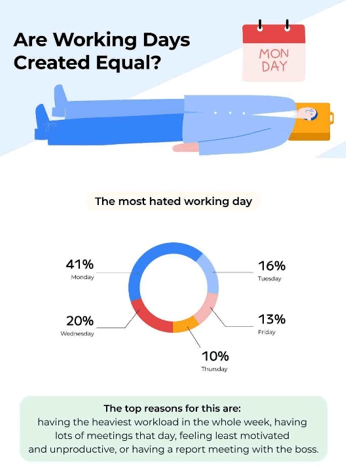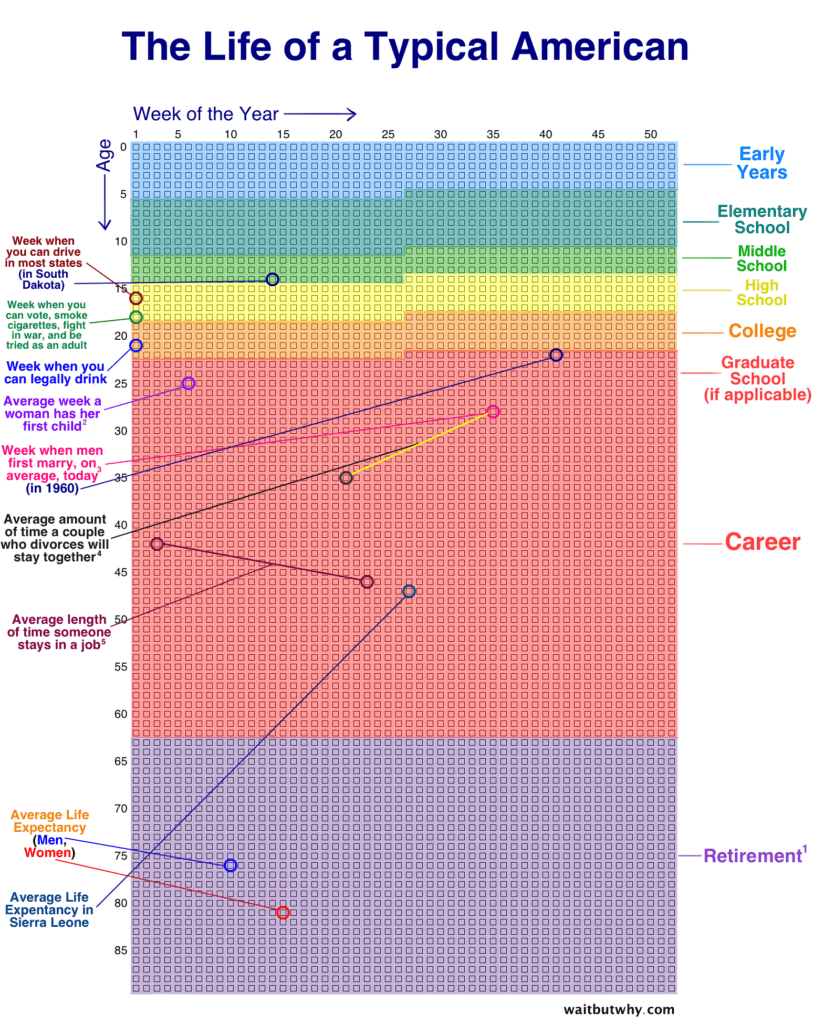
Last week, I had the opportunity to speak with a group of senior executives from a large multinational company.
“How are you all doing today?” I asked
“Great,” said one of the participants with a grin, “and do you know why?”
“No, why?” I asked, intrigued, expecting some significant news.
“Because today is Friday, and it will all be over soon!” he replied, sparking a chorus of smiles and nods around the room.
It got me thinking: is life really just about racing from Monday to Friday or sprinting from one end-of-quarter frenzy to the next?
The sentiment “Thank God it’s Friday” is so ingrained in our culture that it even inspired the name of the popular restaurant chain, TGI Friday’s [1], with its bright neon signs proudly proclaiming, “Here it’s always Friday.” Songs like “Just another manic Monday” by the Bangles further echo this sentiment, longing for the weekend and wishing it was Sunday [for more examples see 2].

Research supports this cultural phenomenon. One survey [3] found that 81% of participants believed Mondays are more stressful than any other workday, other surveys revealed that 80% of Americans [4] and 66% of UK participants [5] experience the “Sunday Scaries,” a term describing the anxiety and dread felt on Sunday evenings just before the workweek begins. This dread is so widespread that Guinness World Records has even declared Monday the worst day of the week [8].

According to many of my clients, these Sunday blues stem primarily from stress around workload, lack of work-life balance, and the looming anticipation of dealing with the unresolved tasks from the previous week.
Research also indicates that Mondays see a spike in stress, suicide rates, and heart attacks [6], as well as significantly more stroke events, particularly among working men [7].
As someone who teaches organizational wellbeing, these findings are not surprising. They correlate with consistently lower rates of work-life balance and higher rates of disengagement at work. This is particularly concerning for today’s leaders who are navigating increasingly complex professional landscapes [see for example here, and here].
So why did I feel so uneasy last week with my group of executives?
Well, consider this: the average life expectancy gives us roughly 4,000 weeks to live [9,10]. If we’re constantly wishing for Mondays, deadlines, or quarters to be over, we’re essentially wishing away a substantial portion of our lives.

In my work with leaders, I often pose this question:
What if we stopped running away from Mondays, end-of-quarters, stressful presentations, and difficult situations?
What if we could gently shift our perspective and greet each Monday with the same enthusiasm we reserve for Fridays?
Imagine a world where Mondays and other challenges are seen as opportunities for growth rather than obstacles to dread.
How about making a conscious effort (just this week) to find joy every day, not just Friday?
After all, life’s too short to wish parts of it away.
What do you think?
References:
-
- (n.d.). TGI Fridays. Retrieved from https://en.wikipedia.org/wiki/TGI_Fridays
- Manic Monday by The Bangles, (Tell Me Why) I Don’t Like Mondays by The Boomtown Rats, Friday I’m in Love by The Cure, to name a few.
- (n.d.). Workweek productivity. Retrieved from https://zety.com/blog/workweek-productivity
- (n.d.). Your guide to winning work: Decoding the Sunday Scaries. Retrieved from https://www.linkedin.com/blog/member/career/your-guide-to-winning-work-decoding-the-sunday-scaries (The effects in this poll were correlated to age groups with 94% of the younger Gen Z generations experiencing the Sunday blues as opposed to only 69% of Boomers.)
- (n.d.). New research shows Monday is the most stressful day of the week. Retrieved from https://www.mind.org.uk/news-campaigns/news/new-research-shows-monday-is-most-stressful-day-of-the-week/
- Maldonado, G., & Kraus, J. F. (1991). Variation in suicide occurrence by time of day, day of the week, month, and lunar phase. Suicide and Life-Threatening Behavior, 21(2), 174-187. PMID: 1887454.
- Kelly-Hayes, M., Wolf, P. A., Kase, C. S., Brand, F. N., McGuirk, J. M., & D’Agostino, R. B. (1995). Temporal patterns of stroke onset: The Framingham study. Stroke, 26(8), 1343-1347. https://doi.org/10.1161/01.STR.26.8.1343
- Guinness World Records. (2022, October 16). Officially declares Monday the worst day of the week [Tweet]. Retrieved from https://twitter.com/GWR/status/1581920448555544576?ref_src=twsrc%5Etfw%7Ctwcamp%5Etweetembed%7Ctwterm%5E1581920448555544576%7Ctwgr%5E38758c02ac1ae829411aba785b4d2c555d5cef18%7Ctwcon%5Es1_&ref_url=https%3A%2F%2Fwww.ndtv.com%2Fworld-news%2Fguinness-world-records-officially-declares-monday-worst-day-of-the-week-3441513
- Well to be more precise: 4070, and 4360 on average for European males and females respectively.
- Wait But Why. (2014, May). Life in weeks. Retrieved from https://waitbutwhy.com/2014/05/life-weeks.html







